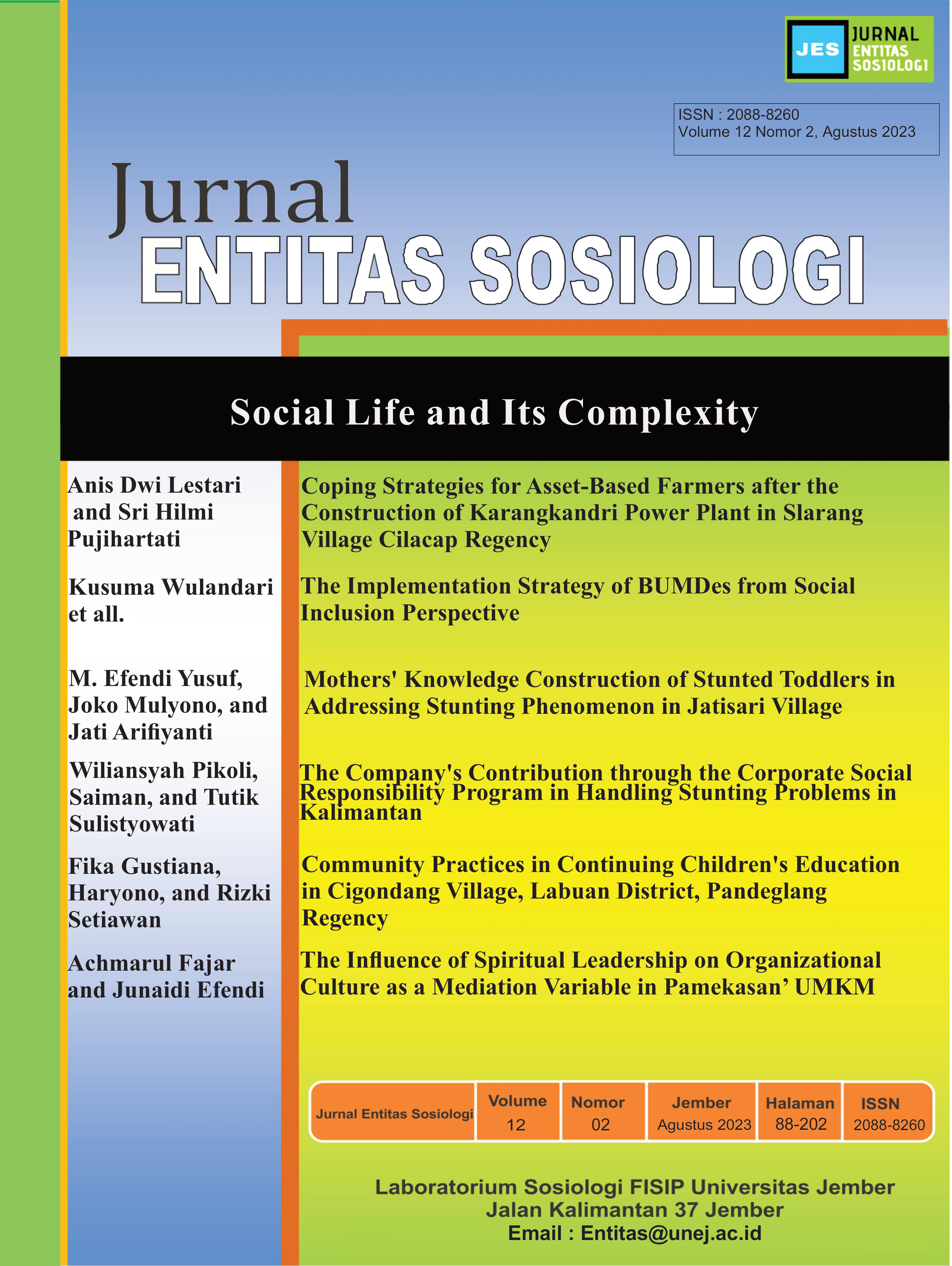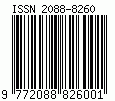Kontribusi Perusahaan melalui Program Corporate Social Responsibility dalam Penanganan Masalah Stunting di Kalimantan
The Company's Contribution through the Corporate Social Responsibility Program in Handling Stunting Problems in Kalimantan
DOI:
https://doi.org/10.19184/jes.v12i2.41148Keywords:
Company, Corporate Social Responsibility, Health, StuntingAbstract
The problem of stunting is a health issue that is not only handled by the government but also companies through their Corporate Social Responsibility activities. The purpose of this study is to see what kind of contribution and impact of CSR programs organized by companies to overcome the problem of stunting in Kalimantan. This study is a literature research. The source of data in this research is obtained from secondary sources, namely company annual reports, books and scientific journals relevant to this research. The data analysis technique in this research was an interactive model consisting of data condensation, data presentation and conclusion drawing. The results of this study indicate that the contribution of three companies, namely PT Pertamina Patra Niaga (PN) Regional Kalimantan, PT Adaro Indonesia, and PT Pertamina Eksplorasi dan Produksi (EP) Asset 5 Sangasanga Field focus on increasing the capacity and quality of health cadres through providing education, training and stunting detection tools as well as providing additional food for pregnant women and toddlers. Through the contribution of these companies, there is a positive impact, an improvement in the health status of stunted toddlers and a decrease in the prevalence of stunting in each area intervened by the company. The results of this study also show the achievement of SDGs on points 2 and 3 as a result of the contributions made by companies through their CSR programs in handling stunting problems.
Keywords: Company, Corporate Social Responsibility, Health, Stunting.
Downloads
References
Harrison, J. D., Young, J. M., Butow, P. N., & Solomon, M. J. (2013). Needs in Health Care: What Beast is That? International Journal of Health Services, 43(3), 567–585. https://doi.org/10.2190/HS.43.3.l
Jouanka, S. D., Kessik, G., Raharjo, S. T., Apsari, N. C., & Irfan, M. (2020). PARTISIPASI CORPORATE SOCIAL RESPONSIBILITY (CSR) DALAM PEMBANGUNAN INFRASTRUKTUR KESEHATAN DI KALIMANTAN. Prosiding Penelitian & Pengabdian Kepada Masyarakat, 7(1), 187–198. https://doi.org/10.24198/jppm.v7i1.28590
Kemenkes RI. (2023). Hasil Survei Status Gizi Indonesia (SSGI) 2022. Jakarta: Kementerian Kesehatan Republik Indonesia.
Khairuddin, A., & Nasution, T. (2023). Pengantar Sosiologi Pendidikan. Medan: Merdeka Kreasi.
Labolo, M. (2021). Government Policy in Handling Stunting and Malnutrition in Children during the COVID-19 Pandemic. AYER JOURNAL, 28(1), 80–99. http://ayerjournal.com/index.php/ayer/article/view/160
Maroni, A., Kusuma, A. R., & Alaydrus, A. (2018). PENGARUH PROGRAM CORPORATE SOCIAL RESPONSIBILITY (CSR) PT. REA KALTIM TERHADAP KESEJAHTERAAN MASYARAKAT DESA PULAU PINANG KECAMATAN KEMBANG JANGGUT KABUPATEN KUTAI KARTANEGARA. eJournal Ilmu Pemerintahan, 6(2), 645–656. http://ejournal.ip.fisip-unmul.ac.id/site/?p=2805
Matsuura, H. (2015). State Constitutional Commitment to Health and Health Care and Population Health Outcomes: Evidence From Historical US Data. American Journal of Public Health, 105(S3), e48–e54. https://doi.org/10.2105/AJPH.2014.302405
Mays, G. P., & Scutchfield, F. D. (2015). Improving Population Health by Learning From Systems and Services. American Journal of Public Health, 105(S2), S145–S147. https://doi.org/10.2105/AJPH.2015.302624
Melisa., Kasmawati., Sitompul, St. A. F. P., Monalisa., Rohani., & Novianti, M. N. (2022). The Government Policy for Stunting Countermeasure Strategy in Indonesia be preparing for Golden Generation 2045. Scholars International Journal of Law, Crime and Justice, 5(12), 554–563. https://doi.org/10.36348/sijlcj.2022.v05i12.006
Miles, M. B., Huberman, A. M., & Saldaña, J. (2014). Qualitative Data Analysis: A Methods Sourcebook (3rd ed.). Thousand Oaks, California: SAGE Publications, Inc.
Nastia, G. I. P., Rachim, H. A., & Irfan, M. (2014). PROMOSI KESEHATAN IBU DAN ANAK MELALUI CORPORATE SOCIAL RESPONSIBILITY (CSR) BIDANG KESEHATAN IBU DAN ANAK. SHARE: Social Work Journal, 4(2), 111–121. https://doi.org/10.24198/share.v4i2.13065
Poloma, M. M. (2010). Sosiologi Kontemporer. Jakarta: Rajawali Pers.
Pope, W. (1975). Durkheim as a Functionalist. The Sociological Quarterly, 16(3), 361–379. http://www.jstor.org/stable/4105747
PT Adaro Energy Indonesia Tbk. (2023). Annual Report 2022. Jakarta: PT Adaro Energy Indonesia Tbk.
PT Pertamina (Persero). (2021). Sustainability Report 2020. Jakarta: PT Pertamina (Persero).
PT Pertamina (Persero). (2023). Sustainability Report 2022. Jakarta: PT Pertamina (Persero).
Pusdatin Kemenkes RI. (2016). Situasi Balita Pendek. Jakarta: Pusat Data dan Informasi Kementerian Kesehatan Republik Indonesia.
Rachman, M. F. (2022). Transformasi Program CSR di Bidang Kesehatan dalam Upaya Pencegahan dan Penanganan Pandemik Covid-19 di Era New-Normal. IJIR: International Journal of Innovation Review, 1(1), 51–60. https://doi.org/10.52473/ijir.v2i1.16
Rafiqah, L. (2018). Pendekatan Struktural Fungsional terhadap Hukum Islam di Indonesia. Jurnal Al-Himayah, 2(2), 205–216. http://journal.iaingorontalo.ac.id/index.php/ah
Raho, B. (2021). Teori Sosiologi Modern (Edisi Revisi). Maumere: Penerbit Ledalero.
Retnaningsih, H. (2015). Permasalahan Corporate Social Responsibility (CSR) Dalam Rangka Pemberdayaan Masyarakat. Aspirasi, 6(2), 177–188. https://doi.org/10.46807/aspirasi.v6i2.512
Salvador-Carulla, L., Lucas, R., Luis Ayuso-Mateos, J., & Miret, M. (2014). Use of the terms “Wellbeing†and “Quality of Life†in health sciences: A conceptual framework. The European Journal of Psychiatry, 28(1), 50–65. https://doi.org/10.4321/S0213-61632014000100005
Sari, M., & Asmendri. (2020). Penelitian Kepustakaan (Library Research) dalam Penelitian Pendidikan IPA. NATURAL SCIENCE: Jurnal Penelitian Bidang IPA dan Pendidikan IPA, 6(1), 41–53. https://doi.org/10.15548/nsc.v6i1.1555
Sheehy, B., & Farneti, F. (2021). Corporate Social Responsibility, Sustainability, Sustainable Development and Corporate Sustainability: What Is the Difference, and Does It Matter? Sustainability, 13(11), 1–17. https://doi.org/10.3390/su13115965
Shobiha, S. M., & Yuniasih, A. F. (2022). Pengidentifikasian Determinan Pembangunan Kesehatan di Indonesia Tahun 2018. Aspirasi: Jurnal Masalah-Masalah Sosial, 13(1), 71–88. https://doi.org/10.46807/aspirasi.v13i1.2404
Situmeang, I. V. O. (2016). Corporate Social Responsibility: Dipandang dari Perspektif Komunikasi Organisasi. Yogyakarta: Ekuilibria.
Smith, W. C., Ikoma, S., & Baker, D. P. (2016). Education, health, and labor force supply: Broadening human capital for national development in Malawi. Cogent Education, 3(1), 1–14. https://doi.org/10.1080/2331186X.2016.1149041
Svensson, O., & Hallberg, L. R.-M. (2011). Hunting for health, well-being, and quality of life. International Journal of Qualitative Studies on Health and Well-Being, 6(2), 1–5. https://doi.org/10.3402/qhw.v6i2.7137
Tampubolon, N., Siregar, H., & Siburian, K. (2022). Tanggung Jawab Negara Terhadap Jaminan Kesehatan dalam Perspektif Hak Asasi Manusia. Nommensen Journal of Constitutional and Administrative Law, 1(1), 25–34. https://ejournal.uhn.ac.id/index.php/administrative_law/article/view/555
White, F. (2015). Primary Health Care and Public Health: Foundations of Universal Health Systems. Medical Principles and Practice, 24(2), 103–116. https://doi.org/10.1159/000370197
Zhang, D., Morse, S., & Ma, Q. (2019). Corporate Social Responsibility and Sustainable Development in China: Current Status and Future Perspectives. Sustainability, 11(16), 1–23. https://doi.org/10.3390/su11164392










